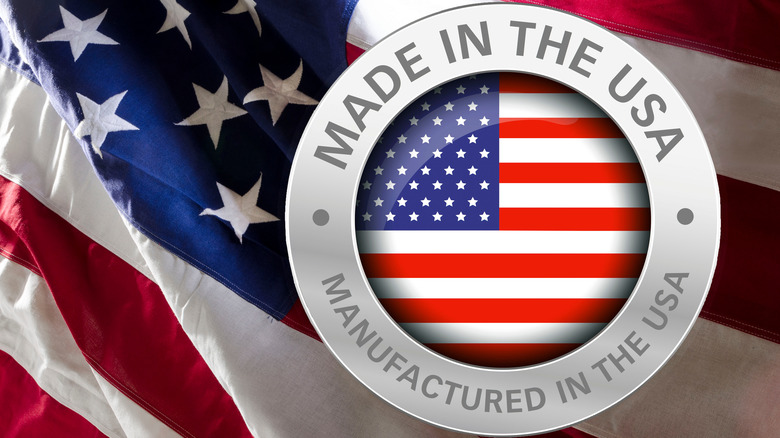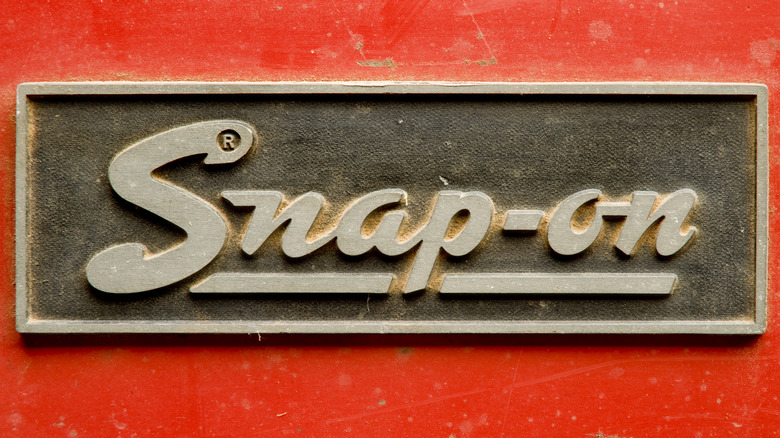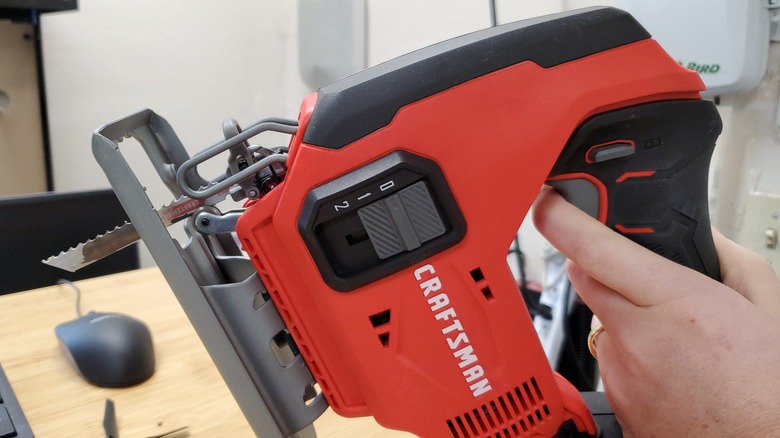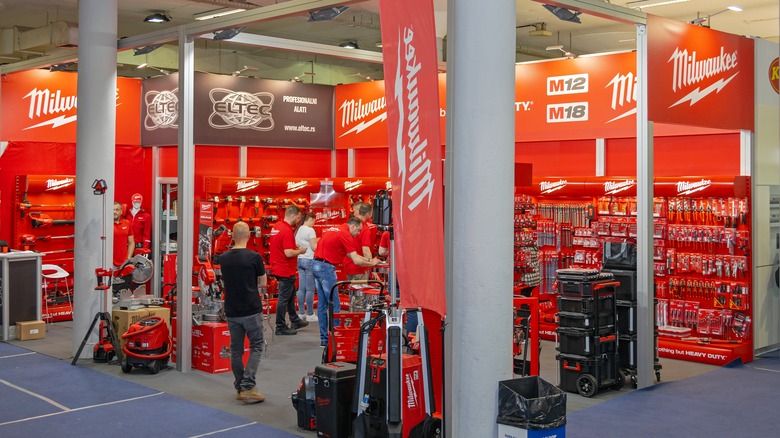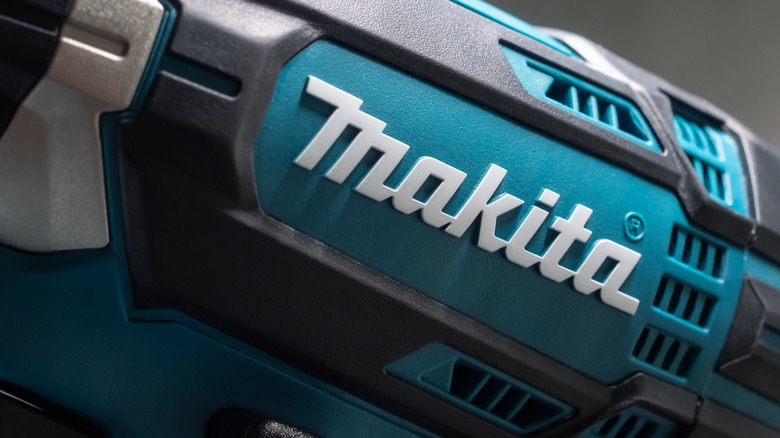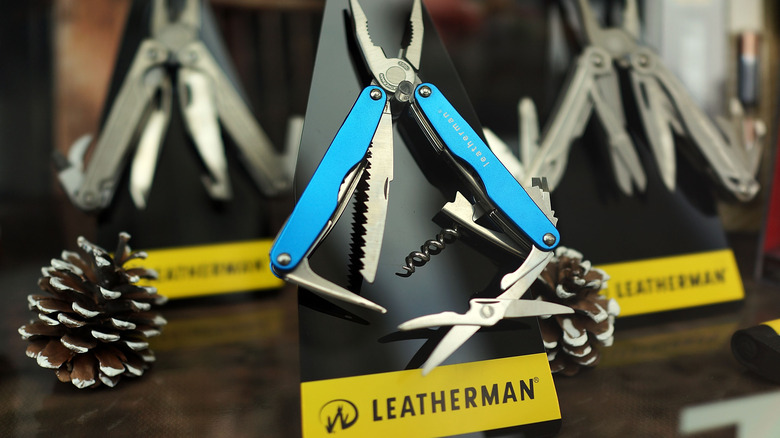These 5 Brands Still Make Tools In The USA
For a lot of American consumers, it's important that the products they buy are made in the United States. This is partly backed by a patriotic belief that American products are well made and of high quality but also by the pragmatic concern for supporting companies that provide local jobs for fellow citizens — helping to keep the domestic economy strong.
Whatever the reason, people who like to "buy American" often find it difficult to determine which products are made in the United States. The market has become increasingly globalized, and many of the things we buy today come from not just one country but many — using raw materials from several locations worldwide, with components also assembled elsewhere. The Federal Trade Commission (FTC) recently put forth guidelines for officially labeling a product as "Made in U.S.A." To earn this label, a product needs all or nearly all of its components sourced from the U.S., and all significant processing and final assembly must also be done on American soil.
Like many companies in other industries, major tool manufacturers have production facilities around the world. However, if you're looking to buy tools made nearby, several of these globalized corporations have factories in the U.S. and offer some products made domestically. Recently, there's been a push to increase domestic production and create more jobs in the country, as well. Here are five brands that still make at least some tools in the U.S.A. and may be making more in the near future.
Snap-on
Snap-on got its start in the 1920s and made a name for itself early on by manufacturing the first ratcheting attachment made for use with an original set of interchangeable socket wrenches. Today, it's known for its premium tools that are often sold directly rather than through retailers like Home Depot and are geared more towards professionals than casual DIYers. Despite many Snap-on tools costing over $200, its customers often find them worth the investment, thanks to their quality craftsmanship.
The company originally made its tools in Milwaukee, Wisconsin, but as it quickly expanded across the country, Snap-on built an 11-acre manufacturing site outside of Kenosha. By 1931, it had already become an international company, and currently, Snap-on sells products and services in over 130 countries across the globe. Seeking to keep its factories close to its customers, Snap-on operates manufacturing facilities in places like China, France, Belarus, Italy, and Brazil. However, the majority of its facilities are still in the U.S., where many of the tools it sells domestically continue to be produced. Current locations of Snap-on factories in America include San Jose, California; Louisville, Kentucky; Algona, Iowa; West Lebanon, New Hampshire; Elkmont, Alabama; Murphy, North Carolina; and, of course, Milwaukee, Wisconsin.
Craftsman
Like many other major tool brands, Craftsman started in the 1920s and quickly became a popular choice for customers looking to buy lawnmowers and electric drills. Today, the brand is still going strong and can be found at retailers like Lowe's and Ace Hardware, offering a wide range of various tools and equipment. Currently, some of its best-selling products include cordless drivers/drills and power saws, leaf blowers, lawn trimmers, and tool cabinets, among others.
Craftsman has several plants located across the continental U.S., with most of them east of the Mississippi River. Factories that make tools and other products with the Craftsman brand can be found in Fort Mill, South Carolina; New Britain, Connecticut; Shelbyville, Kentucky; East Longmeadow, Massachusetts; Golden Valley, Minnesota; Tupelo, Mississippi; and Sedalia, Missouri, as well as in multiple facilities in Pennsylvania, Ohio, and Iowa. Craftsman's factories often specialize in different products. For example, the plant in South Carolina makes 20V power tools like impact drivers and hammer drills, while the one in Mississippi manufactures lawnmowers and snow blowers.
Milwaukee
The history of the Milwaukee Tools begins, of course, in Milwaukee, Wisconsin, where it is currently headquartered. The company has grown significantly since its founding in the 1920s, making a wide range of power tools, hand tools, storage products, and more. Milwaukee tools usually sport the brand's signature fire engine red coloring and can be found around the world, with its top-rated tools sold by Home Depot and other major retailers.
Since it's such a large corporation, it shouldn't be surprising that it has several overseas manufacturing facilities, including China, Vietnam, Taiwan, Germany, and Mexico. Many of the power tools Milwaukee sells in the U.S., which incorporate brushless motors, lithium batteries, and other complicated components, are made in these nations. For example, all the power tools that makeup Milwaukee's popular M18 and M12 lines are made in China.
However, Milwaukee still has factories on American soil that make its products. Two such factories can be found in the company's home state of Wisconsin — one in Mukwonago and one in West Bend, specializing in tools for plumbers, electricians, utility linemen, and other mechanical trades. Two other factories can be found in Mississippi, in Jackson and Greenwood. Milwaukee employed around 7,600 people in 2021 and is in the middle of expanding its domestic footprint, building new facilities in the U.S., including one recently constructed in Cookeville, Tennessee. The company is also expanding what it makes in its existing plants and recently introduced a new line of hand tools, including pliers and screwdrivers manufactured in its West Bend facility.
Makita
Makita and Ryobi all manufacture its electric drills and battery tools in China. To address continued growth here in America, Makita recently added nearly 1 million square feet of distribution and training center space with new facilities in Texas and Nevada. MCA is part of Makita's global manufacturing network, which consists of 10 factories in eight different nations.
Although founded in Japan, Makita has manufactured products in the U.S. since 1985. The Makita Corporation of America is located in Buford, Georgia, and builds capital equipment for manufacturing and assembly and produces Makita products for domestic and international markets. While Makita makes its electric drills and other power tools in China, it makes some of its products in the U.S. and has recently expanded its presence in the American industry.
In addition to Buford, Makita operates warehouse and distribution facilities in Flowery Branch, Georgia; Reno, Nevada; and Wilmer, Texas. All three facilities also provide a hands-on educational experience where contractors and dealers can learn the latest Makita technologies, products, and applications.
Leatherman
Leatherman is a smaller and younger company than many major hardware brands, but since its founding in the 1980s, it's become one of the most trusted names when it comes to multitools. The company makes all of its products from a single factory, which is possible since it's more of a niche brand than that of Black & Decker or Ryobi and focuses on smaller handheld multitools that don't use electronic components.
That factory is located in Portland, Oregon, and has been the heart of Leatherman and its products for four decades. There, Leatherman manufactures the many different kinds of pocket knives and multitools that it's engineered over the years — some that are more all-purpose and others geared towards specific activities like fishing or gardening. That includes the Leatherman Skeletool CX — one of the best multitools for hiking and camping on the market.
Leatherman's multitools are so reliable because they are thoroughly tested in real-world applications, which is made possible by the factory's Pacific Northwest location. Access to the Pacific coast, the Cascade Mountains, and even desert terrain allows Leatherman to test the brand's products before placing them on the market. It doesn't get more "Made in the U.S.A." than that.
